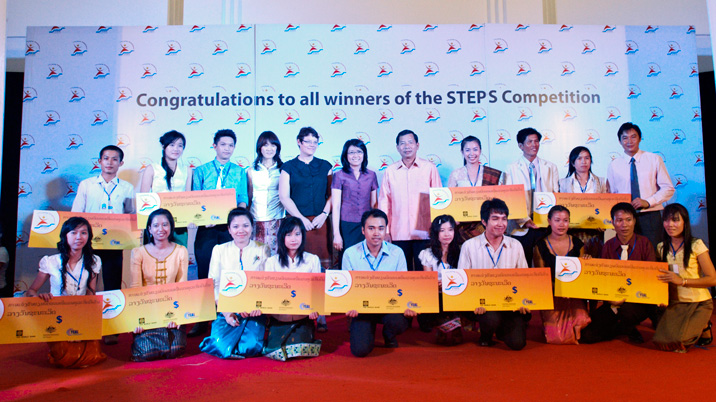VIENTIANE, Laos, June 18, 2011 --The World Bank and AusAid organized the Young Entrepreneurial Marketplace Competition, a contest where young Laotians could pitch their business ideas and turn these into reality over the next year. Candidates stood a chance at winning $5,000.00 and mentorship from the Young Entrepreneurs Association of Lao PDR. 212 proposals- covering business ideas about tech, farm products, and more - were submitted.
Meet the 11 teams who emerged as winners of the competition:
Teaching Computer Skills
Tuny Inthanongsak, Apple Inthanongsak, and Sidavanh Thammavong
“Information technology (IT) is rapidly growing in Laos. We’ve been working with computers and electronics for nine years and know how IT can be used in all work and help generate income. This is why we want to set up a training center for students, teachers, and local people from Dongkhamxang Village (Vientiane) who want to gain IT skills.”
Empowering Women with HIV to Make and Sell Handicrafts
Phennapha Phommachanh and Sengaloun Luenglitthideth
“There are more than 4,000 people in Laos who have HIV and most of them face discrimination because of their illness and unemployment. The Dokataven group was formed in 2004 to help Lao women with HIV regain their strength and also earn. The group, comprising 10 women from Nongbone Village, are now making bed sheets, bags, and handicrafts. Our business will make their products available to foreign buyers inside and outside Laos through direct selling and product orders.”
Hydroponic Vegetables for Sale
Vilaysack Sengphouthay
“In farming, one has to depend on the climate for a good harvest. But new techniques and science now make it possible to do that consistently throughout the year. My market research also shows that people in big cities are very interested in organic vegetables because of their nutritional value. My business idea is to grow organic vegetables for salads using hydroponics (growing plants in water without soil).”
Turning Scraps into Handicrafts
Vilayphone and Bounyong Phetsamone
“We used to collect leftover fabrics from factories and sew them into handicrafts. These became popular in our area and traders would come to our home to buy. I want to expand the business by setting up sewing groups in different areas. We also want to involve disabled and unemployed women in our work.”
Cooking Up Nutritious Food Products
Khampane Kousonsavath
“I buy surplus vegetables and fruits from farms and markets to make preserved food such as fruit jams, ginger tea, and dried banana. My marketing plan is participate in more festivals and have sales incentives- such as giving free items to customers who buy in bulk. I think expanding my business is also good because it will translate to more jobs for the young people in Ban Nonkhor.”
Creating a High-tech Platform for Consumer Feedback
Phavanhna Douangboupha
“YourMoment will provide online marketing and customer tracking tools for companies in Laos. It will allow people to review the services or products and provide this data to companies so that they can improve their business. YourMoment will integrate social media channels like YouTube, Twitter, and more to enhance its services.”
Organizing Ethnic Events for Visitors in Laos
Bounmy Sisamone
“Luang Prabang traditions have been passed down through generations. Our folklore, national dress, and ceremonies are cherished parts of Laos culture. My business is to share these with visitors to our country. An example of this is organizing baci or other ritual ceremonies for couples who visit Laos on their honeymoon.”
Sow-ing Success
Ekkaphoth Thongpadith
“I want to have a pig farm. I’ll start with six pigs because it makes sense to work on a small-scale first and then see which pig breed is most suited for the climate in Luang Prabang. If I’m successful, I plan to increase the number of pigs to raise, hire more workers, and even expand my business to other parts of Laos”.
Mushroom Farming
Orlady Hadaoheauang
“I used to be a sales staff and, during that time, read books about how to grow oyster mushrooms. Inspired, I went to agriculture school and started farming mushrooms with my parents. I currently grow oyster and white mushrooms- these grow during different parts of the year so I have a continuous harvest. I’d like to use the grant money to build a mushroom greenhouse to increase my yield.”
Reselling High Quality Coffee Beans
Souphaphone, Kongkeo, and Souvannalath Sihanon
“95% of Paksong residents are coffee farmers and my family used to be among them. Our coffee garden wasn’t big enough to accommodate market demand so we shifted from farming to buying Arabica and Kang coffee beans from our neighbors and reselling them to big coffee companies. Our proposal is about increasing the amount of coffee we collect in order to meet the current demand.”
Raising Piglets
Khamsoth Outhamixay
“Pork is a meat staple in Lao cooking. Piglets, in particular, are in very high demand because these are cooked during celebrations and year-round festivals. We used to raise just enough piglets for our family to eat during special occasions but I’ve turned it into a small business. I’d like to turn my parent’s land into a pig farm.”

